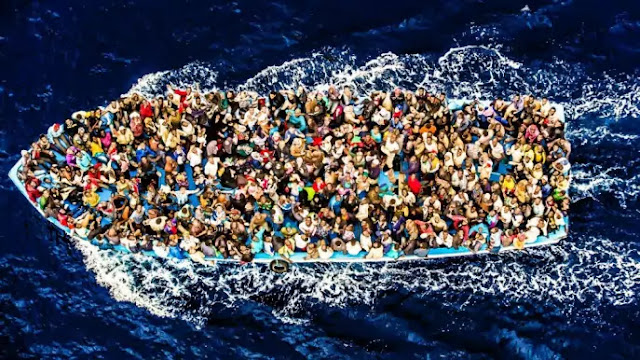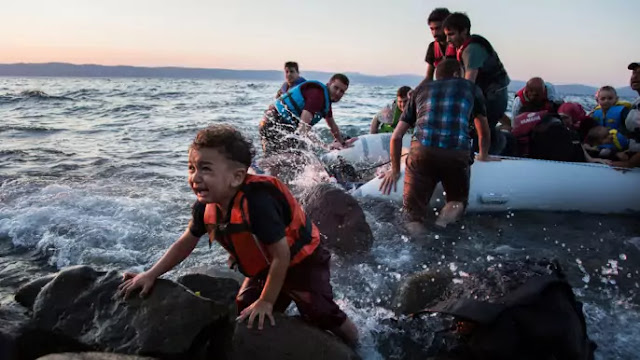The Un Refugee Agency said 823 people died while crossing the Mediterranean Sea in 2021. Meanwhile, more than 40 people were killed when a boat capsized off the coast of Tunisia in the Mediterranean Sea last April.
 |
| Boats floating in the Mediterranean with illegal immigrants |
Among the thousands of crises, problems, and tensions in the political world, the immigration and refugee crisis is one of them.
Although the Corona epidemic limits the movement of people around the world, inhuman things like civil war, terrorism, human rights violations, or forced displacement have not stopped.
As a result, the number of refugees has increased even in the midst of shutdowns around the world. Europe, America, or Asia are currently facing more or less a refugee crisis.
But there is no doubt that Europe is in the greatest danger in terms of numbers and crises.
The only hope is a better life. It's not just that these refugees are fleeing their country to Europe for fear of civil war or loss of life.
Unable to bear the slow development of the Third World or developing countries, many are risking their lives in the deep waters of the Mediterranean to get out of poverty and become economically self-sufficient.
Last night, media reported that 43 migrants had gone missing when a boat that had started its journey from Libya to Europe sank off the Tunisian coast.
Another 84 people from the boat were rescued alive. There are citizens of Egypt, Sudan, Eritrea, and some other third-world countries.
In addition, on June 27, 178 people were rescued from the coast by the Tunisian Coast Guard. Libya and Tunisia coasts are important transit points for illegal immigrants who want to enter Europe via the Mediterranean Sea.
The Un Refugee Agency said 823 people died while crossing the Mediterranean Sea in 2021. Meanwhile, more than 40 people were killed when a boat capsized off the coast of Tunisia in the Mediterranean Sea last April.
Illegal immigrants enter Europe through about five routes. The main of these is the central Mediterranean route.
On this route, migrants from five countries mainly Tunisia, Bangladesh, Ivoricoast, Sudan, and Eritrea travel towards Europe. From January to May this year, about 16,000 illegal immigrants tried to enter Europe through this route.
Another route is the western Mediterranean route, which links Spain and Morocco. About seven and a half thousand migrants from North Africa, Algeria, Senegal, Morocco, Mali, and several other countries entered this route from January to May this year.
Greece via Albania, northern Macedonia, and Greece via Afghanistan, Iraq, Syria via Turkey, and then to other countries within the European Union (EU) are the main plans of migrants or refugees in the region. But most are not succeeding in this plan to migrate to Europe.
The Greece-Turkey political conflict is becoming an immigrant crisis, a political tool for serving interests day by day.
The Western Balkans are one of the main routes for migrant entry into Europe. Entry into the EU via Albania, Bosnia-Herzegovina, Montenegro, Serbia is quite popular among immigrants from Central Asia and Africa.
According to the United Nations Refugee Agency, a total of 82.4 million people in the world have suffered from forced migration as of 2020, of which 48 million have become internally ecological and 26.4 million are direct refugees.
 |
| Photo: United Nations High Commissioner for Refugees |
Syria and Venezuela have contributed significantly to this number. The increase in refugees in Syria is due to the civil war and poverty in Venezuela. That is, for these two main reasons, people are risking their lives and turning to Europe.
Exactly how many have succeeded in the purpose for which they took the risk of crossing such an inaccessible path?
The answers to the above questions can be easily found through the data of international human rights organizations.
The answers to the above questions can be easily found through the data of international human rights organizations.
Various human rights groups in Europe and the United States have accused the Greek Coast Guard of using various forms of violence against refugees on the Greek coast.
Weak refugees, including women and children, are being returned inhumanely, which is against international law. Neighboring Turkey has accused the Greek Coast Guard of sinking migrants' boats, although Greece has denied the allegations.
News and research reports against Greece have shown that asylum seekers have been stranded in the Aegean Sea without any assistance.
Human rights groups have also collected documents on thousands of cases of Greek forces snatching, beating, and forcing helpless immigrants to land on the border in collaboration with the EU border agency Frontex. Earlier this year, Human Rights Watch (HRW) reported that the Greek Coast Guard had tortured migrants in the guise of armed masked terrorists and pushed them back to Turkey.
Human rights groups have also collected documents on thousands of cases of Greek forces snatching, beating, and forcing helpless immigrants to land on the border in collaboration with the EU border agency Frontex. Earlier this year, Human Rights Watch (HRW) reported that the Greek Coast Guard had tortured migrants in the guise of armed masked terrorists and pushed them back to Turkey.
However, such pushback is contrary to the 1951 Refugee Convention, the European Convention on Human Rights, and the European Union.
Greece's crackdown on immigrants also includes sound bombs, rubber bullets, bullets, and tear gas. According to Turkish media reports, several people were killed in Greece's crackdown on migrants in March.
In 2016, an agreement was reached between the EU and Turkey to curb the crisis. The content of which was that Turkey would work on the frontline to reduce the pressure of immigrants in Europe.
Greece's crackdown on immigrants also includes sound bombs, rubber bullets, bullets, and tear gas. According to Turkish media reports, several people were killed in Greece's crackdown on migrants in March.
This is a brief sample of the atonement of people who have used Greece as a transit point for immigrants to enter Europe or who have migrated to Greece. There is no doubt that they have to endure hundreds of hardships and mental anguish to reach Greece.
In 2015, 71 bodies were found in a motor lorry in Austria on its way to Germany on the eve of the migrant crisis in Europe, which brought the then world leaders to a standstill.
How long or how long can people survive by standing in a short-bound place without eating day after day! Yet these people are so keen to go to Europe at such a risk.
In September 2015, five-year-old Alan Kurdi's motionless body was found lying face down on the Coast of Badrum, Turkey, while crossing the Mediterranean Sea. The picture went from the media to social media and created quite a stir.
The body of little Alan, who was lying upside down on the coast, showed world leaders how deep the migrant crisis was taking place.
Nearly six years have passed since then, but world leaders have not found a solution to the migrant crisis.
In 2016, an agreement was reached between the EU and Turkey to curb the crisis. The content of which was that Turkey would work on the frontline to reduce the pressure of immigrants in Europe.
In return, they will receive business-related opportunities and migration aid for sheltering refugees.
Analysts believe that at the root of Europe's immigration crisis are crisis-stricken countries such as Syria, Afghanistan, Iraq, and Yemen.
But even after the deal, Greece complained, Turkey's behavior was not sincere. Instead, Turkey has pushed the immigrants to Greece to put pressure on Greece.
Another transit point for migrants is the Cote d'Ivoire border town of Ceuta and Melilla. And in the midst of all this, only immigration hopefuls are being crushed.
And it is not the case that those who have reached the desired destination after going through so many things are also very comfortable or that the host state has been able to meet their basic needs properly.
And it is not the case that those who have reached the desired destination after going through so many things are also very comfortable or that the host state has been able to meet their basic needs properly.
The children of refugees and immigrants lag behind others in education. At the same time, the governments of many EU countries have failed to provide jobs for able-bodied people.
According to the European Commission, unemployment and depression have increased across Europe due to the migrant crisis and the Corona epidemic.
The unemployment rate was 6.3 percent in March last year; This year it has increased to 7.38 percent. Greece currently has an unemployment rate of 16.3 percent, Spain 15.98, and Turkey 13.9 percent. Yet the expectation of migrants at the risk of life is "Europe".
Analysts believe that at the root of Europe's immigration crisis are crisis-stricken countries such as Syria, Afghanistan, Iraq, and Yemen.
Therefore, no lasting solution to the migrant crisis is possible unless the civil war and political instability in these countries are alleviated. The poorest countries in Africa are also responsible for creating a significant number of immigrants.
Although there is no shortage of resources in Africa, political instability, poverty, and underdevelopment are creating a significant number of refugees from the region. Therefore, the development of Africa will also play an important role in tackling the migration crisis.
At the same time, the sincere attitude of the neighboring countries of the refugee countries is required. Immigrants from Syria or Yemen are choosing Europe over long distances rather than other rich Middle Eastern countries to escape the civil war.
This is because the neighboring rich countries are not giving them shelter. The reason for not granting asylum is that they have not signed the UN Convention Relating to the Status of Refugees. As a result, they are not obliged to give shelter to the refugees.
But in the Middle East, countries like Qatar, Kuwait, Oman, Bahrain, the United Arab Emirates, or Saudi Arabia would have extended a helping hand to alleviate the plight of the refugees.
Resolving this crisis requires greater sincerity and coordination among regional and global leaders. Because there is a need for coordination among leaders and policymakers to end the war and bring peace, to the development of Africa or to meet the basic needs of refugees.
Resolving this crisis requires greater sincerity and coordination among regional and global leaders. Because there is a need for coordination among leaders and policymakers to end the war and bring peace, to the development of Africa or to meet the basic needs of refugees.
But in this political world of realism, the 46 rights of refugees have come to an end on paper. No one has been able to fully guarantee the provisions for immigrants. So in this realistic world, the sudden solution to the immigration crisis is a daydream.
Read next: Myanmar crisis: Which way is the international politics heading?
Author: Jannatul Tazri Trisha
Alumni, Department of International Relations, Jahangirnagar University.
Email: trisha.jannat1112@gmail.com
Email: trisha.jannat1112@gmail.com
Date: 2021-07-07

